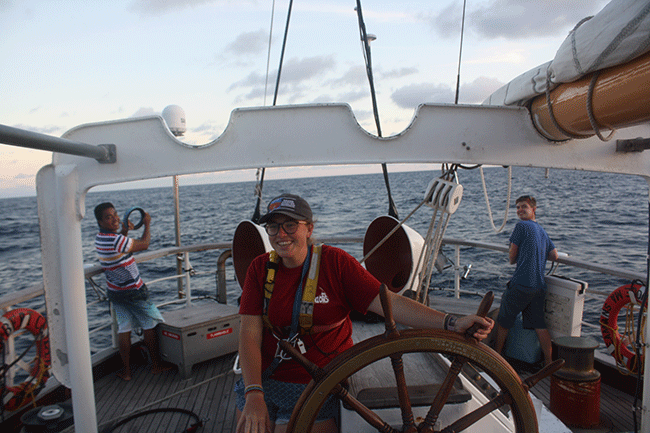Programs Blog
Getting closer to the Equator!

Adam Ziegler, Stonehill College
Ship’s Log
Current Position
0° 10.584’ S, 168° 59.740’ W
Ship’s Heading and Speed
000°, 4.1 kn
Sail Plan
Starboard Tack sailing under the Raffee, Tops’l, Mainstays’l
Weather
Mostly clear skies with some clouds, with a strong SE wind and 4 ft. waves
The SSV Robert C. Seamans has been under outstanding weather for the past few days. Mostly clear skies, with gusts of wind helping move the Seamans ever closer to the equator. At the time of this writing, we are only 0°10.584’ from the equator, and I have already signed up to be woken up for the crossing! Capt. Rick has disclosed comments about a ritual for the crossing, and I am excited to see what it entails. With that being said, the equator heat has also become very apparent with each day averaging around 30 °C a day. All of us are vigorously reapplying sunscreen and being sure to stay properly hydrated. Although our time at sea has been a week, many of us feel that we have been at sea much longer adding to the camaraderie.
Time on the boat has been constant action, with my watch (A-Watch) deploying multiple deployments and setting numerous sails. Our watch today was from 0700-1300 and I helped both on the deck with easing the stays’l (letting more line out so that the sail can catch more wind) and subbed out for a lab hand to operate the hydro-wire. The hydro-wire is a steel cable that is used through a hydraulic winch to deploy the carousel, neuston net, and tucker trawl and into the depths of the ocean.
I have also helped with the 100-counts in lab, which have been briefly mentioned in a previous blog post but I will delve into more detail. A 100-count is a 1 mL scoop of the biomass that was collected in either the neuston net or the tucker trawl and placed into a petri dish. The biomass is then observed under a microscope, and the first 100 organism that come into the field of view are identified and tallied to see the percentages that make up the biomass. Thus far, copepods have been the majority of the biomass. All of these 100-counts are recorded on data sheets and then onto the computer at the end of each watch. Tomorrow my watch (the best watch) will have dawn watch (0100-0700) and night watch (1900-0100). Although watches are each six hours long and can be tiring, we all still find time to relax and partake in fun activities.
These past two days had some exciting activities to keep morale high and get a break from the watches. Yesterday during class time (1430-1530) there was a line chase, which comprised of all the watches participating in a relay race to identify the location of all the sail lines on the boat. Today there was a Field Day, which consisted of a deep cleaning of the boat. A Watch was tasked with cleaning the galley, which was made all the better when our steward Lauren handed out chocolate bars (and they were the good kind of chocolate bars, not the Hershey stuff).
Most days groups of us will hang on the roof of the dog house (parents I promise this is 100% safe) and sing while Michaela plays her Ukulele. Mom and dad, you will not be surprised to hear that I have managed to find the boat fishing gear, and in my free time have thrown a couple lines with Harrison and Miita out before we reach PIPA in hopes of catching a tuna. Although we say that it feels like we have been on this boat for months, I would not change this time for anything. I savor every minute out at sea with my spectacular shipmates and am truly grateful for every moment out here.
I want to thank my mom and dad for helping me be on this incredible experience. I love you guys and can’t wait to tell you about all that I have done. You have supported my love for the ocean throughout my childhood and now it being rewarded in spades.
– Adam Ziegler, Stonehill College
Recent Posts from the Ships
- Ocean Classroom 2024-A collaborative high school program with Proctor Academy
- Collaborations and Long-term Commitments: SEA’s Caribbean Reef Program Sets a Course for Coastal Programs that Compliment Shipboard Experiences.
- Sea Education Association students prepare for life underway using state of the art nautical simulation from Wartsila Corporation.
- SEA Writer 2022, Magazines From the Summer SEA Quest Students
- Technology@SEA: Upgrades Allow Insight into Ocean Depths
Programs
- Gap Year
- Ocean Exploration
- High School
- Science at SEA
- SEA Expedition
- SEAScape
- Pre-College
- Proctor Ocean Classroom
- Protecting the Phoenix Islands
- SPICE
- Stanford@SEA
- Undergraduate
- Climate and Society
- Climate Change and Coastal Resilience
- Coral Reef Conservation
- Marine Biodiversity and Conservation
- MBL
- Ocean Exploration: Plastics
- Ocean Policy: Marine Protected Areas
- Oceans and Climate
- Pacific Reef Expedition
- The Global Ocean: Hawai'i
- The Global Ocean: New Zealand